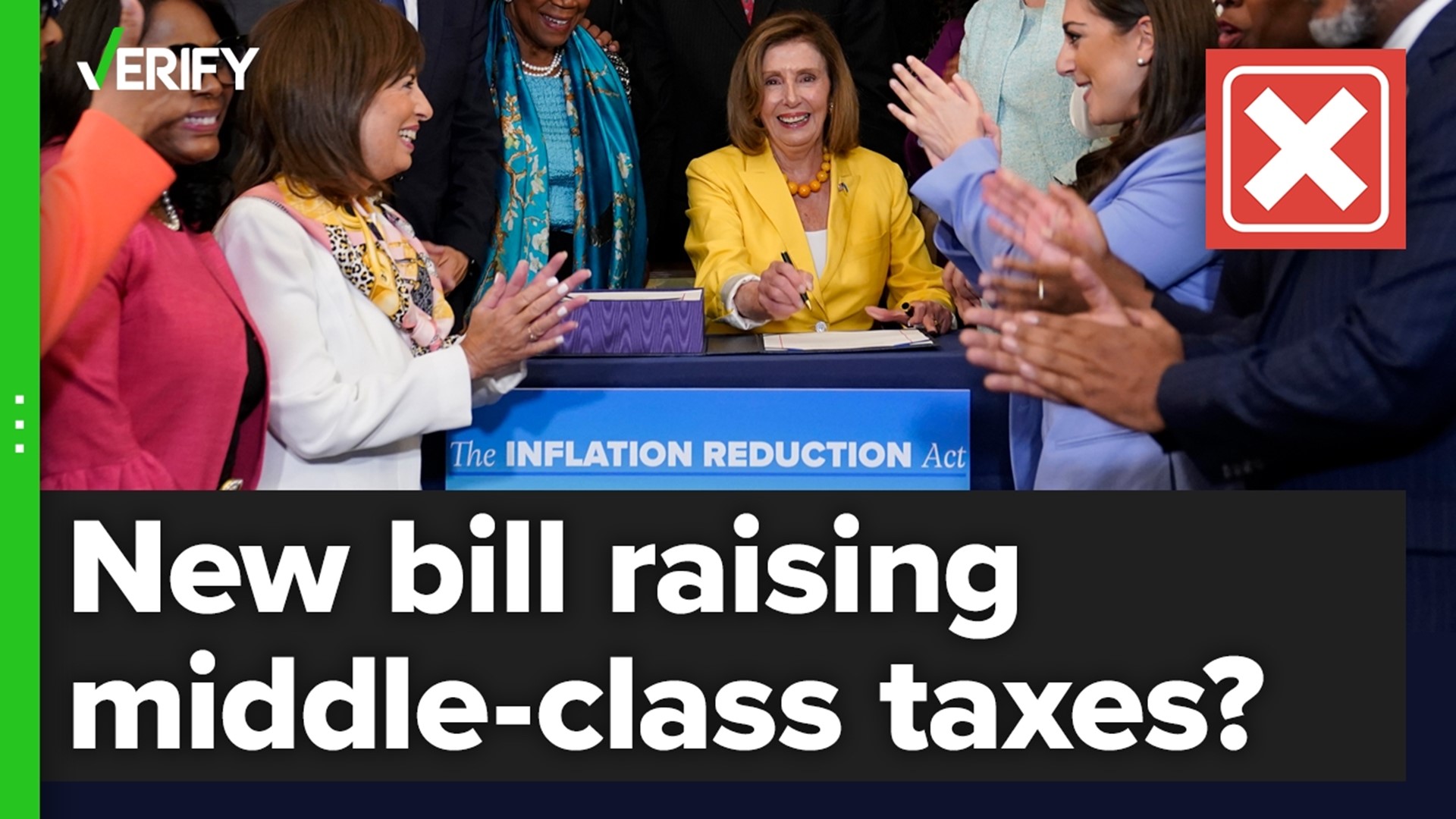The Inflation Reduction Act of 2022, which includes some tax credits for Americans, has been signed by President Joe Biden.
But how will the legislation impact you when filing your next tax return? Some people on social media are claiming that the Inflation Reduction Act is a “tax increase on the middle class,” while others say middle-class Americans won’t pay more in income taxes.
Several VERIFY readers have also reached out to the team to ask if the Inflation Reduction Act raises individual income taxes.
THE QUESTION
Does the Inflation Reduction Act raise income taxes on the middle class?
THE SOURCES
- Inflation Reduction Act of 2022
- Joint statement from former U.S. Treasury Department secretaries
- Howard Gleckman, senior fellow at the Urban-Brookings Tax Policy Center
- Tax Foundation, an independent think tank
THE ANSWER
No, the Inflation Reduction Act doesn’t raise income taxes on the middle class. There are no individual income tax increases included in the legislation at all.
WHAT WE FOUND
Though President Biden has proposed income tax increases in the past, there are no individual income tax increases included in the Inflation Reduction Act at all, Howard Gleckman, senior fellow at the Urban-Brookings Tax Policy Center, told VERIFY.
The full bill text of the Inflation Reduction Act of 2022 doesn’t mention income tax or any other kind of tax assessed on individuals.
In a joint statement, former U.S. Treasury Department secretaries from Democratic and Republican administrations reiterated that income taxes will not increase for middle-class Americans.
The legislation does impose a 15% minimum tax on corporate book income for corporations with profits over $1 billion, effective for tax years beginning after Dec. 31, 2022. Congress’ Joint Committee on Taxation estimates that only about 150 corporations annually would be subject to the proposed tax.
That means these large corporations would pay 15% of the income they report to shareholders.
“Because there can be large discrepancies between income reported in financial statements and on tax returns, the minimum book income tax may be larger than the regular income tax,” the Tax Policy Center explains.
The legislation also includes a tax on companies that buy back stock from their shareholders, according to Gleckman.
Though there aren’t any increases to individual income taxes, some critics of the Inflation Reduction Act say the tax on large corporations could negatively impact some middle-class Americans, Gleckman explained.
“Most analysts…when we look at the distribution of tax changes, assume that corporations don’t actually pay the tax, that ultimately the tax is paid by either shareholders or by workers,” he said. “So a company that has less after-tax income has less money to pay its workers. A company that has less after-tax income because its taxes went up, the value of the shares goes down.”
Still, the increased tax on corporations doesn’t mean a person will owe more money on their income tax return.
The former Treasury secretaries defended the extra taxes levied on corporations by saying they “do not reflect increases on the corporate tax rate, but rather the reclaiming of revenue lost to tax avoidance and provisions benefitting the most affluent.”
Along with the corporate tax increase, the Inflation Reduction Act “modifies, extends and creates a variety of tax credits” for Americans, primarily through 2031 or 2033, according to the Tax Foundation.
More from VERIFY: Inflation Reduction Act only caps insulin prices for Medicare patients, not for people with private insurance
The legislation also extends a Trump-era law that caps how much in losses business owners can write off on their taxes. The law was set to expire in 2027, but the bill keeps it alive through 2029.
There are about two dozen energy-related tax credits, including those for people who buy electric vehicles, and credits for people who purchase health insurance, Gleckman said. But, again, those credits won’t show up on your tax return, either.
“Even though it’s described as a tax credit, the person who buys insurance – the taxpayer – never sees it. The money actually goes to the insurance company and the insurance company reflects the value of that credit by lowering the premium of the person who buys the insurance policy,” Gleckman said. “So it never shows up. There’s no line on your [Form] 1040 that says ‘premium tax credit.’”
Similarly, if a person buys an electric vehicle, the dealer will knock $7,500 off the price of the car under the legislation – but the credit won’t be reflected on their income tax return, according to Gleckman.
CBO report does not say Inflation Reduction Act would change individual income tax rates
Some VERIFY readers have reached out to the team asking about news headlines, like this one from the New York Post, that say the Inflation Reduction Act will “cost the middle-class $20 billion in new taxes.” These reports cite the Congressional Budget Office (CBO), a nonpartisan federal agency that analyzes budgetary and economic issues.
The claims stem from a proposed amendment to the Inflation Reduction Act filed by Sen. Mike Crapo (R-Idaho). It would have prevented the IRS from using any of its $80 billion in funding included in the legislation for audits on Americans with taxable incomes below $400,000, according to a press release.
Crapo’s office did reiterate that there are no direct increases on personal income tax rates included in the Inflation Reduction Act. Instead, the projected $20 billion in IRS revenue would stem from “increased IRS enforcement,” a spokesperson for Crapo wrote in an email.
Crapo’s proposed amendment did not pass the Senate.
VERIFY reached out to the CBO to ask about the potential impact of Crapo’s proposed amendment. A spokesperson told VERIFY that the agency “did not complete a formal cost estimate in advance consideration of the amendment,” but did provide information to the Senate Budget Committee.
If the proposed amendment preventing audits passed, it could have reduced IRS revenues by at least $20 billion over the next decade, according to the CBO’s preliminary assessment.
That means the projected $20 billion in revenue would come from audits – not individual income taxes, as Crapo mentioned. But the IRS and U.S. Department of the Treasury have said audits will not increase for middle-class Americans.
The IRS is hoping to hire new staff with funding from the Inflation Reduction Act to “improve taxpayer services and experienced auditors who can take on corporate and high-end tax evaders,” according to the Treasury Department. It will not increase audit rates “relative to historical norms” for people earning under $400,000 per year.
IRS Commissioner Charles Rettig also assured Senate members in a recent letter that the IRS would not “increase audit scrutiny on small businesses or middle-income Americans.”












